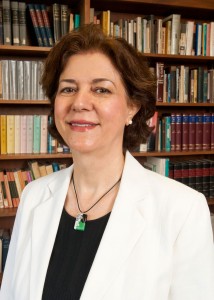CSUN Professor Ponders What It Means to be Muslim in America

Nayereh Tohidi
Gender and women’s studies professor Nayereh Tohidi, director of the Middle Eastern and Islamic Studies Program at California State University, Northridge, feels her stomach clench every time she hears about an alleged terrorist attack.
“You kind of hold your breath and think, ‘please, don’t let them [the perpetrators] be Muslim,’” she said.
It’s a silent plea, Tohidi said, that is shared by thousands of Muslim Americans across the country who are grappling with what it means to practice Islam during a time when some politicians equate their faith with terrorism.
“It is simplistic to think the problem is Islam per se,” said Tohidi, an internationally recognized scholar on gender and Islam who has served as a consultant to the United Nations on the status of women in Eurasia and the Middle East. “The problem is that a small segment of Muslims has turned religion into a totalitarian ideology — ‘Islamism’ — and is committing heinous crimes in the name of Islam. And, in the process, they are tainting all of us. Muslims are over 80 percent of the victims of such ‘Jihadism’ or ‘Islamist terrorism.’
“We need to remember that Judaism, Christianity and Islam were all born in the same region of the Middle East, and their foundations for faith are very similar,” she said. “All Abrahamic religions include violent elements in their scriptures that can be resurrected and deployed for political and ideological purposes.”
The escalating anti-immigrant and anti-Muslim political rhetoric has created a climate where some people struggle with how open they can be about their faith, Tohidi said.
“Some struggle with the question of whether they should withdraw, hide in the margins or try to hide the part of their identities that is Muslim,” she said. “While others — you saw this after 9/11 — have responded by embracing their religion and, if they are women, proudly wearing hijab and saying, ‘Wearing a headscarf does not mean I am a terrorist.’ Many Muslims do not believe that covering hair or wearing headscarf is an Islamic mandate. But in recent decades, it has turned into a part of the identity politics more so than a reflection of the faith”
For scholars like Tohidi, a vocal advocate of women’s rights, human rights and secular politics, the pressure to “choose sides” can seem overwhelming, particularly when the tenets of the faith are misconstrued to justify discrimination, violence and death.
“One reaction is to keep a low profile about your Islamic identity or become defensive and apologetic about the flaws within your tradition and community,” she said. “But for someone who is an activist and scholar in a university setting, I cannot keep quiet or lose my critical perspective toward oppression and discrimination practiced by any cultural communities or political forces. I have to maintain a balance that makes sense.”
Tohidi has written numerous papers and articles for journals around the world criticizing the use of Sharia law — the religious law forming part of the Islamic tradition — to justify the discrimination against women and religious minorities in some Muslim-majority countries where the state and law are based on Sharia. She said she feels a responsibility to continue to advocate for women’s rights, equal rights and democracy in the Middle East and beyond, and to target Islamic leaders who use an outdated and unreformed Sharia to justify social inequality in their own countries.
“There are those who say that when you do that, you are reinforcing Islamophobia,” she said. “But I say, ‘no, I am not.’ We need to be consistent and critical if we are going to fight injustice. To fight racism and prejudice against Muslims, you cannot deny that violence and sexism also exist in the community. Drawing attention is not divisive, it is fighting for what is right.
“You have to have an intersectional approach,” Tohidi said. “You can be critical of your own community as well as of the ones who try to ban or demonize yours. You are not ‘washing your dirty clothes’ in front of everybody to shame the community. You are washing your dirty clothes because there are dirty clothes.”
An intersectional approach, she said, may provide the foundation for bringing people together and encouraging dialogue between differing views and faiths.
“Do not forget that the oppression of women is also connected to terrorism, and socioeconomic class issues are connected to ethnicity,” Tohidi said. “When you connect all the dots, and there are a lot of dots, you can see the whole picture better, thus targeting repressive and unjust politics wherever it happens. We need to build coalitions — non-sectarian, non-ideological coalitions — to fight against violence, to fight against war. And we need to respect diversity and accept each other so we can live and work together.”

 experience
experience